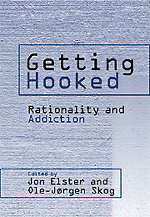Book contents
- Frontmatter
- Contents
- Preface and Acknowledgments
- Contributors
- Introduction
- Addiction and Social Interaction
- Addiction, Weakness of the Will, and Relapse
- The Dangers of Willpower
- The Neurobiology of Chemical Addiction
- To Legalize or Not to Legalize: Is That the Question?
- Rationality, Irrationality, and Addiction – Notes on Becker's and Murphy's Theory of Addiction
- Gambling and Addiction
- A Visceral Account of Addiction
- Epilogue: Rationally Coping with Lapses from Rationality
- Index
Epilogue: Rationally Coping with Lapses from Rationality
Published online by Cambridge University Press: 05 June 2012
- Frontmatter
- Contents
- Preface and Acknowledgments
- Contributors
- Introduction
- Addiction and Social Interaction
- Addiction, Weakness of the Will, and Relapse
- The Dangers of Willpower
- The Neurobiology of Chemical Addiction
- To Legalize or Not to Legalize: Is That the Question?
- Rationality, Irrationality, and Addiction – Notes on Becker's and Murphy's Theory of Addiction
- Gambling and Addiction
- A Visceral Account of Addiction
- Epilogue: Rationally Coping with Lapses from Rationality
- Index
Summary
A man gave up smoking three months ago. For the first six or eight weeks he was regularly tormented by a desire to smoke, but the last three or four weeks have been less uncomfortable and he is becoming optimistic that he has left cigarettes behind for good. One afternoon a friend drops in for a business chat. The business done, our reformed smoker sees his friend to the door; returning to the living room, he finds, on the coffee table, an opened pack of cigarettes. He snatches up the pack and hurries to the door, only to see his friend's car disappear around the corner. As he will see his friend in the morning and can return the cigarettes, he puts the pack in his jacket pocket and hangs the jacket in the closet. He settles in front of the television with a before-dinner drink to watch network news. Twenty minutes into the news, he walks to the closet where his jacket hangs and takes the cigarettes out of the pocket, studies the pack for a minute, and walks into the bathroom, where he empties the cigarettes into the toilet and flushes it. He returns to his drink and his news.
What have we witnessed? I think we can confidently guess that our subject came to anticipate that in the presence of the cigarettes something might occur that he did not want to happen; by disposing of the cigarettes he has made it not happen. Wasting a dollar's worth of his friend's cigarettes was an inexpensive safeguard.
- Type
- Chapter
- Information
- Getting HookedRationality and Addiction, pp. 265 - 284Publisher: Cambridge University PressPrint publication year: 1999
- 3
- Cited by



